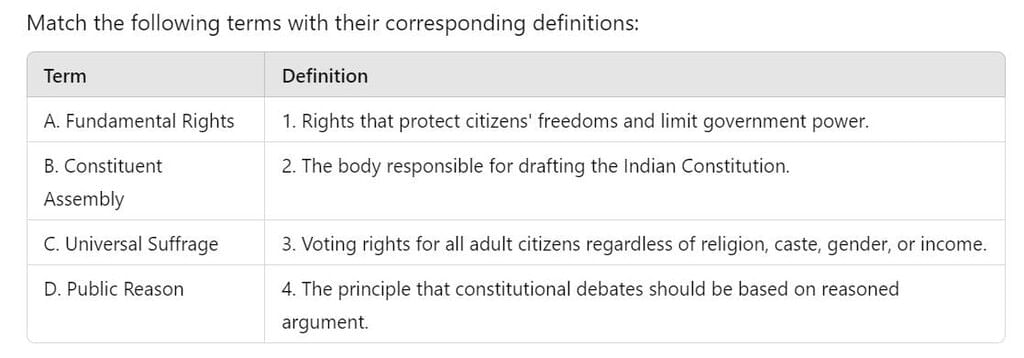Test: Constitution: Why And How?- 2 - UPSC MCQ
10 Questions MCQ Test - Test: Constitution: Why And How?- 2
When did Nepal emerge as a democratic republic and adopted a new constitution respectively?
Assertion (A): The Constituent Assembly of India aimed to achieve a consensus to protect diverse interests during the drafting of the Constitution.
Reason (R): The Assembly operated in a highly secretive manner, limiting public access to its debates.
Which of the statements given above is/are correct?
i. A constitution reflects the unique historical traditions and diverse groups of a nation while establishing democratic governance.
ii. The Indian Constitution prioritizes ethnic identity for citizenship.
iii. Constitutions often share common features like the protection of basic rights.
iv. The relationship between different regions of a nation and its central government is not addressed in constitutions.
Assertion (A): The Constitution of India was adopted in a period marked by significant social turmoil and violence.
Reason (R): The framers of the Constitution were under pressure to create a document that represented the interests of various religious communities and social classes.
How many members were present on 24 January 1950 in Constituent Assembly?
Assertion (A): The Objective Resolution of 1946 laid the foundational principles that influenced the Indian Constitution.
Reason (R): The resolution emphasized the need for a government that reflects the promises of the nationalist movement, including democracy and equality.
How many members of the assembly were from scheduled castes?
Which of the statements given above is/are correct?
i. A balanced arrangement of government institutions is essential for an effective constitution.
ii. The framers of the Constitution aimed to create a system that focused solely on the central government.
iii. The parliamentary system adopted in the Constitution helps in distributing powers between the executive and the legislature.
iv. The Constituent Assembly did not consider the experiences of other countries while framing the Constitution.
Given below are two statements:
Statement I: The Directive Principles of State Policy are justiciable and enforceable by the courts.
Statement II: Balanced Institutional Design is crucial to prevent any single group from dominating the government.
In the light of the above statements, choose the correct answer from the options given below:















